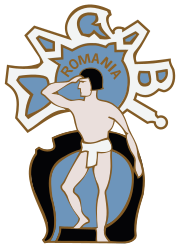 | |||
| Full name | Maccabi București | ||
|---|---|---|---|
| Founded | 15 May 1919 | ||
| Dissolved | 1948 | ||
| Ground | Calea Dudeşti | ||
|
| |||
Maccabi or Macabi București, later known as Ciocanul, was a Romanian sport club, representing the Jewish community, akin to the famous Hakoah Vienna. Named after the Maccabees and centering on football competitions, it was the first Jewish side to send a player, the goalkeeper Samuel Zauber, to the FIFA World Cup (at its 1930 edition in Uruguay).
YouTube Encyclopedic
-
1/5Views:26 1221 4052 79341 2317 124
-
Maccabi Tel Aviv - Hajduk Split 2 - 1 All Goals (Europa League - Qualification - 18.08.2016)
-
Maccabi Haifa F.C. - The Road To Europa League
-
2006 (August 22) Maccabi Haifa (Israel) 1-Liverpool (England) 1 (Champions League)
-
[LIVE HD] Hapoel Beer Sheva - FCSB ( Steaua Bucuresti ) ~ Europa League ~ 19.10.2017
-
1998 October 1 Maccabi haifa Israel 3 Paris St Germain France 2 Cup Winners Cup
Transcription
History
Maccabi București was founded in 1919 by a Jewish entrepreneur at a time when representatives of the ethnic minorities of Greater Romania established distinctive football sides (another such example was Elpis Constanţa, which was owned by a Greek-Romanian businessman).[1] In 1925, a women's seven-a-side handball team was inaugurated as a branch of the Maccabi club, but, like all Romanian teams of the time, only played exhibition games (usually, as a prelude to competitive football matches).[2]
Before the 1940–1941 season, at a time when Romania adopted antisemitic policies, the club was expelled from official competitions. It reemerged in 1945 at the end of World War II and kept its name before merging with another club to form Ciocanul.[3]
For the 1946 season, the club was coached by Hungarian coach Béla Guttmann, who went on to coach many prominent European and South American teams of the 1940s and 1950s.[4] Due to food shortages, Guttmann insisted his salary be paid in vegetables.[5][6] He subsequently walked out on the Romanian club after a director attempted to intervene in team selection.[7] German journalist Hardy Grune believed that he was frustrated with the corruption in the Romanian soccer world.[6]
As Ciocanul, the club played in two seasons in Divizia A. In May 1948, it merged with Unirea Tricolor București, to create the present-day major Romanian club Dinamo, which was administrated by the Ministry of the Interior.[8] During the 1947–1948 season they remained two separate clubs: Dinamo A (Ciocanul) and Dinamo B (Unirea-Tricolor).[8]
Honours
- Winners (0):, Best finish: 7th 1946–47
References
- ^ Popan, Cosmin (2006-09-06). "Onomastica hazlie a fotbalului". Cotidianul (in Romanian). Retrieved 2007-07-21.
- ^ "Cronologie. Geneză – pionierat – afirmare. Perioada interbelică: 1921 – 1945" (in Romanian). Romanian Handball Federation. Archived from the original on 2007-09-28. Retrieved 2007-07-22.
- ^ Ganur, Tomer (2006-08-10). הקשר הישראלי של דינמו בוקרשט. Ynet (in Hebrew). Yedioth Ahronoth. Retrieved 2007-06-09.
- ^ Wilson, Jonathan (2018). Inverting the pyramid: the history of soccer tactics (Second trade paperback ed.). New York, NY. ISBN 9781568589190. OCLC 1024085926.
{{cite book}}: CS1 maint: location missing publisher (link) - ^ Contested Fields; A Global History of Modern Football
- ^ a b Wilson, Jonathan (2019). The Names Heard Long Ago: How the Golden Age of Hungarian Soccer Shaped the Modern Gam. Bold Type Books. ISBN 978-1568587844.
- ^ "Bela Guttmann: The Coach, The Curse & The Lament of The Eagles". 24 September 2019.
- ^ a b Popeangă, Marius. "Stadioanele dispărute ale vechilor București". Adevărul (in Romanian). Archived from the original on 2012-07-22. Retrieved 2008-04-28.
